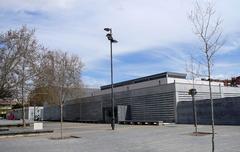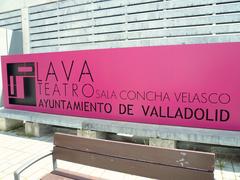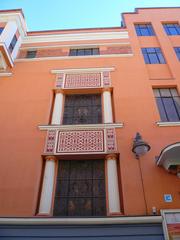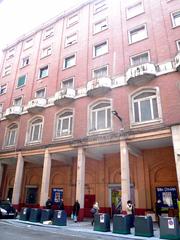
Teatro Calderón Valladolid: Visiting Hours, Tickets, and Historical Significance
Date: 04/07/2025
Introduction
Teatro Calderón, located in the vibrant center of Valladolid, Spain, is a cultural landmark renowned for its stunning neoclassical architecture and dynamic performing arts programming. Since its inauguration in 1864, the theater has stood as a testament to Valladolid’s artistic ambitions and its ongoing commitment to cultural excellence. This comprehensive guide provides detailed information on Teatro Calderón’s history, visiting hours, ticketing, accessibility, architectural highlights, programming, and practical tips to help you plan an enriching visit to one of Spain’s most treasured historical sites. For deeper insights, consult official resources such as the Teatro Calderón website, the city’s cultural portal Valladolid.es, and historical archives (Wikipedia).
Historical Overview
Origins and Construction
The site of Teatro Calderón was once home to the medieval palace of the Duke of Osuna. In the mid-1800s, this palace was demolished to make way for a modern theater reflecting Valladolid’s aspirations to rival the great cultural venues of Europe (Wikipedia; tcalderon.com). Designed by architect Jerónimo de la Gándara, with an innovative iron framework by engineer Miguel de Bergue, construction began in 1863. The iron structure provided both fire resistance and design flexibility, a pioneering feature for the era (es.wikipedia.org).
Inauguration and Early Years
Teatro Calderón opened its doors on September 28, 1864, with Pedro Calderón de la Barca’s celebrated play “El alcalde de Zalamea,” honoring the theater’s namesake (tcalderon.com; Wikipedia). The opening marked a cultural milestone for Valladolid, drawing the city’s elite to its grand neoclassical façade and opulent Italianate auditorium, exquisitely decorated by scenographer Augusto Ferri. With an initial capacity of approximately 1,200, the theater quickly became a hub for social gatherings and high-caliber performances (es.wikipedia.org).
Cultural Significance and Golden Age
By the late 19th and early 20th centuries, Teatro Calderón was at the heart of Valladolid’s cultural life, hosting notable artists and premieres. Its programming included plays, operas, concerts, and social events, solidifying its status among Spain’s premier theaters (cultura.valladolid.es).
Architectural Features and Innovations
Teatro Calderón’s neoclassical façade, inspired by Friedrich Schinkel, features grand columns, arched windows, and ornamental detailing (tcalderon.com). The horseshoe-shaped auditorium ensures excellent acoustics and sightlines. Decorative elements, including Art Nouveau lamps and Ferri’s original paintings, create a luxurious ambiance. Advanced stage machinery and the iron skeleton allowed for sophisticated productions and enhanced safety (es.wikipedia.org).
Twentieth-Century Challenges and Renovations
The 20th century brought challenges, including periods of decline due to changing artistic tastes and economic shifts. A major restoration in the 1990s, led by architects Jaime Nadal and Sebastián Araujo, modernized facilities while preserving historic elements. The theater reopened in 1999, reaffirming its central role in Valladolid’s cultural scene (Wikipedia).
Modern Era and Continued Relevance
Today, Teatro Calderón remains a leading venue for theater, opera, ballet, flamenco, and international festivals, notably hosting the Semana Internacional de Cine de Valladolid (Seminci) since 1973 (Wikipedia; minube.net). The complex includes spaces for exhibitions and educational programs, making it a cornerstone of Valladolid’s cultural identity (valladolid.es).
Visitor Information
Location and Access
Teatro Calderón is located at Calle de las Angustias, 1, 47003 Valladolid, in the historic city center—within walking distance of Plaza Mayor, the National Sculpture Museum, and other major attractions (The Tourist Checklist). The theater is easily reached by foot, city buses, or taxi, and parking is available nearby, though spaces may be limited during major events (Adventure Backpack).
Visiting Hours
Box office hours vary seasonally. Typically, it is open Monday to Saturday from 10:00 AM to 2:00 PM and 5:00 PM to 8:30 PM, with extended hours on performance days. Summer and holiday schedules may differ; check the official website for current information (Butaca Oro).
Tickets and Booking
Tickets can be purchased online via the theater’s official website or at the box office. Prices generally range from €10 to €50, with discounts for students, seniors, and groups. Season passes (abonos) are available for regular attendees, with prices varying by seating area and number of shows (Europa Press). For group bookings or special events, contact [email protected] or call +34 983 426 444 (Musical El Fantasma de la Opera).
Accessibility
Teatro Calderón is fully accessible, offering ramps, elevators, wheelchair seating, and adapted performances. Audio description services and discounted tickets are available for visitors with disabilities (Plena Inclusión Castilla y León).
Guided Tours
Guided tours provide access to the auditorium, backstage areas, and the grand staircase, offering insights into the theater’s history and architecture. Tours are generally available on weekends; check the official website or local tourist offices for current schedules (Gaceta Valladolid).
Photography
Photography is permitted in public areas and during guided tours but is not allowed during performances.
Programming and Events
Annual Schedule
Teatro Calderón hosts around 19 major shows per season, including plays, musicals, operas, dance performances, and concerts (Europa Press). The 2024/2025 season features renowned Spanish actors, classic and contemporary works, and national companies such as the Ballet Nacional de España.
- Major musicals: e.g., “Chicago” during the city’s festivals
- Dance and flamenco: Performances by leading Spanish choreographers
- Opera: Productions with the Orquesta Sinfónica de Castilla y León
- Festivals: Host venue for the Semana Internacional de Cine de Valladolid (Seminci) (Seminci Official)
Check the official calendar for up-to-date listings.
Educational and Community Programs
The theater runs educational workshops, family programming like “Calderón en Familia,” and supports amateur theater with annual competitions (Teatro Calderón Programas Educativos).
Architectural and Cultural Highlights
Neoclassical Design
Teatro Calderón’s façade displays neoclassical symmetry, grand porticos, and sculptural reliefs, while the interior features a horseshoe-shaped auditorium, ornate balconies, and gilded boxes (Gaceta Valladolid). Decorative arts, including stucco reliefs and painted friezes, celebrate classical mythology and the performing arts.
Modernization and Preservation
A major renovation in 1999 modernized the theater while preserving its historical character, ensuring it remains a top venue for both traditional and contemporary performances (El Norte de Castilla).
Practical Tips for Visitors
- Book early: Popular shows and festivals sell out quickly.
- Arrive early: Allow time to enjoy architectural details and avoid queues.
- Dress code: Smart casual is recommended for evening performances.
- Accessibility: Contact the theater in advance for specific needs.
- Nearby dining: Plenty of restaurants and tapas bars are within walking distance (Life Success Journal).
Nearby Attractions
Combine your visit with other Valladolid highlights:
- Plaza Mayor: The city’s bustling main square (The Tourist Checklist)
- National Sculpture Museum: Exceptional Spanish art collection
- Casa de Cervantes: Former home of Spain’s great writer
- Valladolid Cathedral: A short stroll from the theater
Visitor Statistics and Impact
Teatro Calderón draws over 93,000 audience members annually, reflecting its status as Valladolid’s most important cultural venue (Europa Press). With extensive programming, community engagement, and international partnerships, it remains a pillar of the city’s artistic landscape.
Frequently Asked Questions (FAQ)
Q: What are Teatro Calderón’s visiting hours?
A: Visiting hours vary by season and event. The box office is typically open Monday to Saturday, with extended hours on performance days. Always confirm on the official website.
Q: How can I buy tickets?
A: Purchase tickets online via the official website or at the box office.
Q: Is the theater accessible for those with disabilities?
A: Yes, the theater is fully accessible and offers additional services for visitors with disabilities.
Q: Are guided tours available?
A: Yes, usually on weekends. Check with the theater for current availability.
Q: Can I take photographs inside the theater?
A: Photography is permitted in public spaces and during tours, but not during performances.
Conclusion
Teatro Calderón is more than a historic building—it is a living center of Valladolid’s cultural identity and a prime destination for visitors seeking world-class performances, architectural beauty, and a glimpse into Spain’s artistic heritage. To maximize your experience, check current visiting hours and programming, book tickets in advance, and consider joining a guided tour. For up-to-date information, visit the official website and download the Audiala app for personalized recommendations, guided audio tours, and real-time updates.
Visitor Recommendations
- Plan your visit to coincide with major festivals or performances for a memorable experience.
- Explore nearby attractions to enrich your cultural journey in Valladolid.
- Take advantage of accessibility features and educational programs offered by the theater.
- Stay connected by following Teatro Calderón and Audiala on social media for the latest news and exclusive content.
Sources and Further Reading
- Teatro Calderón de Valladolid, 2024, Wikipedia
- Visiting Teatro Calderón: History, Tickets, and Visitor Information, 2024, tcalderon.com
- Teatro Calderón Valladolid: Visiting Hours, Tickets, and Architectural Highlights, 2024, Gaceta Valladolid
- Teatro Calderón Valladolid: Visiting Hours, Tickets, and Cultural Highlights, 2024, Ayuntamiento de Valladolid
- Teatro Calderón Valladolid: Visiting Hours, Tickets, and Visitor Guide, 2024, Europa Press
- Semana Internacional de Cine de Valladolid (Seminci) Official Website, 2024
- Valladolid Cultural Portal, 2024







